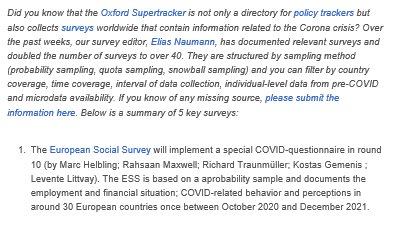
In the new editorial of #MomentumQuarterly, we (@leonidobusch @astridmager Stefanie Wöhl & I) look back on 10 years of #MomentumQuarterly. To mark the anniversary, we introduce two novel prizes: the Best Paper Award and the Impact Award.
1/6
1/6

1. The #MomentumQuarterly Best Paper Award 2021 goes to Heinar Heiland (@TUDarmstadt) and Simon Schaupp (@UniBasel_en @UniBasel) for their article "Digital atomisation or new labour struggles? Resistant solidarity cultures in platform-mediated courier work".
2. The #MomentumQuarterly Impact Award 2021 goes to Karin Fischer (@jkulinz) and Bernhard Leubolt (@KatholischeSZ) for their article "On the way to more equality? Social policy in Brazil and Chile after the 'shift to the left'".
Our journal statistics reflect #Covid19 implications: while we had 54% women among all published authors in 2019, there have only been 4 (!!) female authors in #MomentumQuarterly last year. We would like to invite especially submissions by female early career researchers.
The average time from submission to final decision on publication of a paper was just around 100 days in 2020. This means that we have been able to reduce review times by over 50 per cent within three years.
This improvement is not least thanks to @tamesberger, who has taken on a leading role as editor of #MQ since 2015 and will support us as a reviewer in the future.
Personally, I'd like to express my gratitude to you, @tamesberger, for the brilliant introduction into the tasks of an editor and advice you provided to me over the last year!
You are now perpetuated in a new section on the MQ Website 😉 momentum-quarterly.org/ojs2/index.php…
You are now perpetuated in a new section on the MQ Website 😉 momentum-quarterly.org/ojs2/index.php…
• • •
Missing some Tweet in this thread? You can try to
force a refresh








